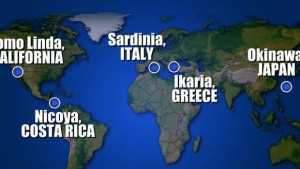Out of the blue
 How to eat? Paleo or vegan? Mediterranean or Okinawan? Raw? Juiced? Gluten free? Low glycemic? High fiber? Low fat? Intermittent fasting? Is there a “right” way? Is there a clear path to robust health through nutrition?
How to eat? Paleo or vegan? Mediterranean or Okinawan? Raw? Juiced? Gluten free? Low glycemic? High fiber? Low fat? Intermittent fasting? Is there a “right” way? Is there a clear path to robust health through nutrition?
Yes and no. As the China Study I wrote about last week makes so clear that even fourth-generation cattle ranchers might hoist themselves out of their saddles to take notice, animal protein – especially in the astounding amounts Americans consume – is a fast track to chronic illness and accelerated aging .
If you look at the eating habits of the healthiest, longest-lived people on earth, the active, vibrant inhabitants of the so-called Blue Zones, you’ll see, generally, a plant-based diet. But you’ll also see variations that reflect differences in geography, climate and culture. And you’ll seem, yep, some animal protein.
The Blue Zone Sardinians love their pecorino cheese and drink a considerable amount of read wine. On the other side of the world, the Blue Zone Okinawans consume no diary, love fish and sip tea all day. The Greeks (on Ikaria, dubbed “the island where people forget to die” – and not because they suffer from dementia…which they don’t) drink goats’ milk, love their olive oil and make liberal use of wild herbs.. In the only “zone” in N. America, The Seventh Day Adventists are vegetarian teetotalers who eat beans and nuts. The diet of the Nicoyan Costa Ricans is perhaps the simplest: corn and beans. So, no, there is not one true path. There is eating real, whole foods, eating local, and taking joy in that.
That is a big “and.” We hard-charging, must-find-the-one-true-path North Americans might experiment by adopting one way of eating or another – fads come and go, best-selling diet and nutrition books come and go — but we hardly ever joyously adopt.
It may be this lack of joy, actually, that is holding us back. I don’t mean just holding us back in eating consciously, healthily and happily but in living vibrant, active lives.
The Blue Zone folks? Sure, they eat simple, healthy foods. But they also often have a direct relationship with the food they eat, and they celebrate it with family. They create unpretentious rituals around eating. And so food is a pleasure – not, as it is for many of us, a long list of do’s and don’t, of can-haves and must-haves.
It’s not just food that brings them pleasure (and helps extend their healthy lives). They experience the joy of having a life-long strong sense of purpose. Yes, life-long. They feel needed. They are needed. They feel (and are) useful. Long long past “retirement” age, they actively contribute to the daily lives of their families and their communities. This, just as much, perhaps more, than any particular diet is their “secret” to the extraordinarily active, extraordinarily long, virtually disease-free lives.






0 comments
Kick things off by filling out the form below.
Leave a Comment